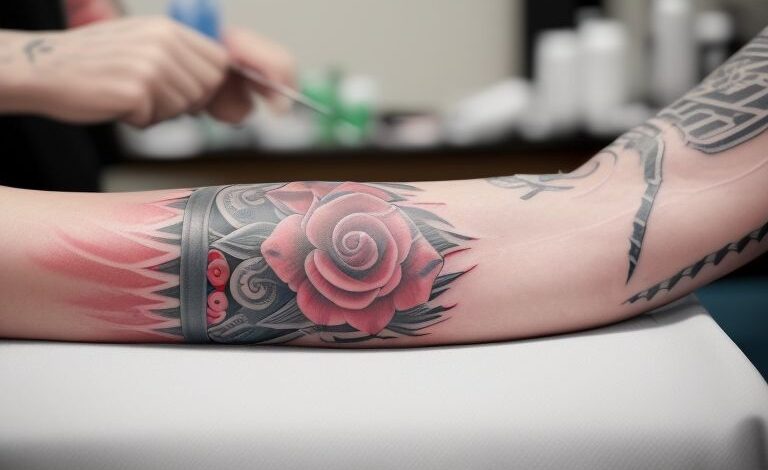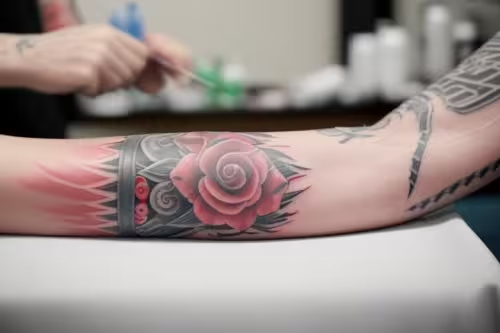How Long After Getting a Tattoo Can You Donate Blood?

Getting a tattoo is a popular form of self-expression, but if you’re someone who also likes to give back by donating blood, you may wonder how this impacts your ability to donate. Blood donation is a crucial act that saves lives, but it comes with certain guidelines to ensure the safety of both the donor and the recipient.
If you’ve recently gotten a tattoo, it’s important to know when you can donate blood again. In this article, we’ll cover the guidelines, factors that influence donation eligibility after getting inked, and how you can prepare to donate blood safely.

How Long After Getting a Tattoo Can You Donate Blood?
In the United States, most blood donation centers, including the American Red Cross, require you to wait at least 3 to 12 months after getting a tattoo before donating blood. However, this waiting period can vary depending on several factors, such as the location where the tattoo was done and local regulations.
Key Factors That Determine When You Can Donate Blood After a Tattoo:
- State Regulations: If your tattoo was done at a state-regulated tattoo shop that uses sterile needles and fresh ink, you may not need to wait as long as you would if the tattoo was done at an unregulated facility.
- Infection Risk: The main concern with donating blood after getting a tattoo is the risk of infections such as hepatitis B, hepatitis C, and HIV, which can be transmitted through unsterile equipment or contaminated ink.
- Country-Specific Guidelines: Different countries have different blood donation regulations, so the waiting period may be different if you’re donating outside of the U.S.
Why Is There a Waiting Period?
The waiting period after getting a tattoo is primarily in place to reduce the risk of bloodborne infections. Even though many tattoo parlors follow strict hygiene practices, the risk of infection remains if proper sanitation measures aren’t followed. Blood donation centers must ensure that the blood supply remains safe for recipients, which is why the waiting period is crucial.
State-Regulated Tattoo Shops vs. Unregulated Tattoo Shops
The waiting period after a tattoo largely depends on whether the tattoo parlor is state-regulated. A state-regulated tattoo shop follows specific safety and sanitation guidelines, ensuring that sterile needles and new ink are used for each client. If you get your tattoo from such a shop, many blood donation organizations, such as the American Red Cross, may waive the waiting period altogether, allowing you to donate blood immediately.
On the other hand, if you received your tattoo from an unregulated parlor or in a location where tattoo practices aren’t governed by safety regulations, you’ll typically need to wait 12 months before donating blood. This is due to the higher risk of contracting bloodborne infections in such settings.
How to Check if a Tattoo Parlor Is Regulated
If you’re unsure whether your tattoo shop is regulated, you can:
- Ask the shop directly: Tattoo parlors that follow state regulations will often display their certification or license, and staff should be willing to answer any questions regarding their safety protocols.
- Check local health department websites: Most state health departments maintain a list of licensed tattoo parlors that adhere to health and safety standards.
Guidelines for Blood Donation After Tattoos Around the World
The rules for donating blood after getting a tattoo vary depending on where you live. Here are some general guidelines:
United States
- If your tattoo was done in a state-regulated facility, you may not need to wait at all.
- If the tattoo was done in an unregulated facility, the waiting period is typically 12 months.
Canada
- Canadian Blood Services generally requires a 6-month waiting period after receiving a tattoo, regardless of where it was done.
United Kingdom
- The NHS Blood and Transplant Service requires a 4-month deferral period after getting a tattoo.
Australia
- The Australian Red Cross Lifeblood requires a 4-month waiting period after getting a tattoo, even if it was done in a licensed parlor.
If you’re unsure of the regulations in your country, it’s best to check with your local blood donation center for specific guidelines.
Can You Donate Blood After Getting a Tattoo Abroad?
If you got your tattoo outside of your home country, the blood donation guidelines might differ. In some cases, tattoos done in foreign countries where hygiene practices are not closely regulated may increase the waiting period to donate blood. Some countries may require a 12-month deferral period for any tattoos obtained internationally due to the increased risk of infection transmission.
What Are the Risks of Donating Blood Too Soon After Getting a Tattoo?
If you donate blood before the recommended waiting period, there is a risk that you could transmit an undiagnosed infection through your blood. Infections like hepatitis B and C can remain dormant in the body for weeks or months before symptoms appear, making it crucial to allow enough time for any potential infections to manifest before donating.
Blood donation centers test every donation for infectious diseases, but the testing process has limits. The waiting period acts as an extra safeguard to protect recipients from potentially harmful pathogens.
How to Prepare for Blood Donation After a Tattoo
Once you’ve met the waiting period requirements, here are some tips to prepare for your blood donation:
- Stay Hydrated: Drink plenty of water before your donation to make the process smoother.
- Eat Iron-Rich Foods: Foods like spinach, beans, and red meat help replenish your iron levels, which is important for donating blood.
- Get Plenty of Rest: Being well-rested can help prevent dizziness or fainting after donating.
- Bring Identification: Most donation centers require a form of ID, so make sure to bring yours with you.
- Inform the Staff About Your Tattoo: Let the staff know about your recent tattoo and provide any necessary information, such as where it was done.
Frequently Asked Questions (FAQ)
1. Can I donate blood if my tattoo is fully healed?
The healing status of your tattoo does not affect the waiting period. Even if your tattoo is fully healed, you still need to follow the deferral period guidelines.
2. Why do some countries have different waiting periods for tattoos?
Different countries have varying regulations on tattoo hygiene and blood donation safety. Waiting periods reflect each country’s public health standards and the risks associated with bloodborne infections.
3. Can I donate blood if I got a tattoo at home?
If you received your tattoo in an unregulated setting, such as at home, you will typically need to wait 12 months before donating blood due to the higher risk of infection.
4. Can I donate plasma after getting a tattoo?
The waiting period for donating plasma is generally the same as for whole blood donation. You’ll need to check with your local plasma donation center for specific guidelines.
5. What if I got a tattoo touch-up—do I need to wait again?
Yes, if you get a tattoo touch-up, the waiting period resets, and you’ll need to wait the recommended time before donating blood again.
Getting a tattoo doesn’t mean you have to give up donating blood forever, but it does come with some important considerations. Depending on where and how you got your tattoo, you may need to wait between 3 to 12 months before you can donate blood again. Always check with your local blood donation center for specific guidelines, and be sure to follow their recommendations to ensure the safety of both donors and recipients.
By waiting the appropriate amount of time and preparing for your donation, you can continue giving the gift of life while enjoying your new tattoo.



